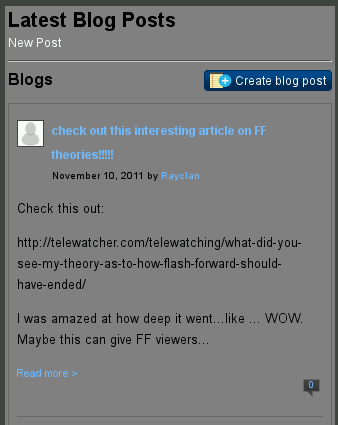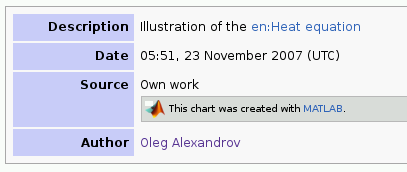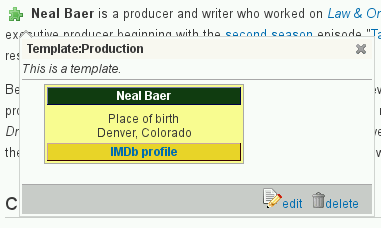Main menu
You are here
The Fan Wiki Situation
If you're in the habit of searching Google for things that have to do with your favourite TV show, you may have come across an entire wiki devoted to it. Wikipedia certainly has its own articles about fictional universes but the fan wikis are supposed to report on them in a much more detailed and obsessive way. Even though you sometimes see them on Wikipedia, detailed descriptions of every scene in a movie are unencyclopedic. These belong on the fan wikis because "merely being true, or even verifiable, does not automatically make something suitable for inclusion" as stated in the relevant Wikipedia policy.
Most of these fan wikis are hosted on Wikia, a for-profit site that used to have the same look and feel as Wikipedia. By now, the look and feel has drastically diverged. Even though it still uses the same software, Wikia has been dumbed down and uses gimmicks like floating bars that follow you as you scroll down the page. However, I still use the site a great deal because the amount of information on it is truly vast. What I want to do now is explain the differences between the two interfaces and then give some ideas for wikis that haven't been created yet.
Apart from the ads and floating bars, other things on Wikia sites make them look unprofessional. Sometimes you see links to blog posts on the front page. It makes sense for an article to keep track of what fan sites exist - even very opinionated ones. But hosting them on the front page detracts from the objectivity an encyclopedia is supposed to have.

Images on Wikia also don't have pages about them. These pages are used by Wikipedia to keep track of copyright status and store information about what software was used to create the image.

Also, my experience is that Wikia attracts more poor spellers than Wikipedia! Other differences include an optional WYSIWYG mode. Some fan wikis have it and some don't.


As someone who is used to Wikipedia, I find the interface very limited. You can try calling me an elitist, but wait there's more! I tried to click the visual tab in the Harry Potter wiki above and I was even told by the site that the visual editing mode was too limited!

Even when visual editing mode can be used, many objects appear as mysterious puzzle pieces. It seems that only minor edits can be made this way. But I cannot find a way of marking an edit as minor!

It is worth saying that these changes to the theme affect most Wikia encyclopedias but not all of them. Uncyclopedia, despite being a Wikia project now, recreates the Wikipedia theme as closely as possible in order to be a good parody. This makes it one of the fun fan wikis to edit. I have thought of some other wikis that would be fun to edit. They seem like big projects though, so I am not seriously thinking about starting any of them right now.
- Puzz-3D: There is a Lego wiki and even a small K'nex wiki but as far as I know, the third toy I used to always build has yet to be immortalized in wiki form. There is a fan site whose information is almost complete so maybe fixing up the K'nex wiki should take priority.
- Mathematical proofs: There are plenty of math wiki projects like Encyclopedia Of Math, Planet Math, PolyMath, Open Problem Garden and The Art Of Problem Solving, and Wolfram's encyclopedia is quite extensive as well. However, they don't focus on actually proving the theorems. Ideally a wiki could do this and emphasize the hierarchy. The article on Poisson's equation could prove that solutions exist and include a link to the Lax-Milgram theorem. The proof of this would include a link to the Riesz representation theorem and so on. Some of the tedious proofs could include code snippets like the theoretical physics book does.
- Free software hacking: The Freshmeat site and several Wikipedia articles try to describe all free software that is worth using. However, they sound a lot like ads in how they list features. What would be better is a wiki that assumes some programming knowledge and keeps track of how often programs are developed, what features receive the most attention and where unofficial patches that do interesting things can be found. I don't think it should be tailored to a specific GNU / Linux distribution either. The packages in a Linux distro often make choices for you. Debian might say that libswfdec requires gstreamer. But if one were to compile an older version, it could be made to use libavcodec instead. A good version history would mention dependencies and cite version control commits that add and remove them. If the program absolutely will not work without a dependency, this should be mentioned. Otherwise, configure flags that control whether the dependency is used should be explained. Information about whether they are statically linked, dynamically linked or opened at runtime would be included as well.
- Anti-DRM: Some non-free pieces of software (particularly games) are infected with DRM. Everyone should be aware of this and a wiki should say which files and registry keys get left behind when you uninstall a game. There are fun ways to discover this and many games are conquered with no-CD cracks. People who hold onto copies of these cracks can keep using them years later once the peak popularity of the game is over. Everyone else is out of luck if the site goes down. A wiki about Cedega has information for running a bunch of games on Linux. This has much in common with the goal of defeating DRM. But I would still like to see detailed information for each game about whether it's SafeDisc, SecuROM, StarForce or data position measurement that gets used. If the wiki intended to host its own software, it would be wise to pick a suitable country for the servers ahead of time.
- Classic Flash: I guess this is a bit like Know Your Meme but it would be great if a wiki discussed the glory days of Flash games and videos. With all the plagiarism that went on, one would need to make it clear where each video originated, where it was later found and what other videos came from the same author. Most of the major players in this game are still up: Albino Blacksheep, Newgrounds and the assholes who kept stealing from them. The former has even converted its Flash videos to HTML5.
- FIFA: A number of sports wikis exist (including a skiing one that sounds like it will be very useful to me) and there is a wiki about the Olympic games but I cannot find a wiki for the sporting event with an even larger following; the World Cup. There is a lot of information on Wikipedia, but it would be nice to see pages on each game and what the highlights were.
- More author wikis: Several authors have wikis about their books, but I would add at least one more; Robert J. Sawyer. The usual material for inclusion would be plot summaries, character summaries and behind-the-scenes information. But in Sawyer's books you can read about a rich collection of scientific topics: Earth's mass extinctions, quantum entanglement, Lagrange points, cellular automata, mitochondrial DNA and the effort to teach English to chimps. An article about one of these topics could list the books in which it appears and provide more in-depth information in case someone who read the book is interested and wants to follow up.
- Wikis that incorporate the concept of personal canon: Perhaps this is too nerdy a dream to come true, but it would be great. Many of the most hardcore Star Wars fans think that the prequel trilogy is disgraceful. The ultimate Star Wars wiki would have an option allowing signed-in users to exclude certain works. If articles were put together with enough metadata, pages could render for them without mentioning their least favourite episodes and still appear consistent. This style would be especially powerful for long running TV shows. It's hard to like all 20+ seasons of The Simpsons. Instead a well crafted wiki would present it as if it were a 13 season show for a fan who likes the first 13 seasons. Some people only like the first four seasons of Lost or the first five seasons of 24. And some people don't think all incarnations of Law & Order are equally worthy of being mentioned in a wiki. Most franchises eventually go downhill and nobody likes everything. Therefore a feature like this that allows us to take nerdy egotism to the extreme would be most welcome.
But then again, I suppose the regular Wikipedia still has a long way to go. Even well known events that were a huge deal when they happened can fade into obscurity after a few years. Elections in my country after 2000 are documented quite well. The page not only tells you the party leaders and the winning candidates in each riding, it tells you the other candidates who ran as well and how many votes they each received. Elections before 2000 do not have this. Awards can be poorly covered too. Take NAACP Image Awards for example. The article for 2005 gives all of the information I would expect; winners and nominees in all categories. The one for 2004 only lists winners. The one for 2003 only lists one category. And there are no Wikipedia articles about the awards prior to 2003 even though they started in 1967. Let's all dig through paper archives for the sake of posterity!
